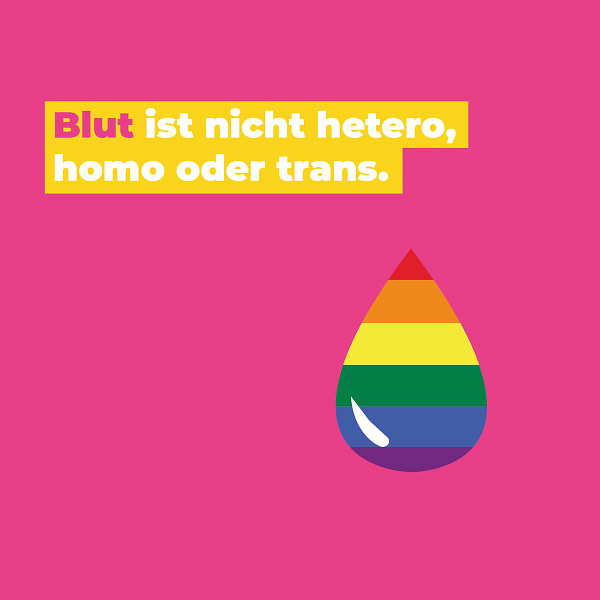Queer Blood
The coalition has agreed to lift the ban on MSM blood donation -- but what will that look like and will the Red Cross agree?
Servus!
European LGBTQ rights organizations have long campaigned against national bans that prohibit gay and bisexual men from donating blood. While some countries like the United Kingdom, France, and Germany have liberalized their laws in recent years, Austria holds to a rule which states that any man who has had sex with another man (MSM) within the last 12 months cannot give blood for a period of one year. Bans like Austria’s, the organization ILGA Europe argues, do not take “into consideration sexual behavior or practices and exclude those men simply because of whom they are.” Identity and not behavior is understood to be a risk factor and threat to public health.


Austria’s ban on gay blood donation has been a point of contention inside the coalition government since its inception. Last year, the Green-controlled health ministry wanted to reduce the cooling-off period during which MSM cannot give blood from 12 to four months, but the idea never went anywhere. Opposition campaigners remain discontented. Yannick Shetty, a parliamentarian from the liberal NEOS party and its spokesperson on LGBTQ issues, believes that modern testing capabilities make the total exclusion of MSM from blood donation outdated and unnecessary. His position is backed by the Social Democratic Party (SPÖ) as well as a coalition of business interests.
As I wrote in a previous newsletter to you, the major obstacle to progress on LGBTQ rights in Austria has always been the conservative People’s Party (ÖVP), the party of the historic Catholic camp in Austria. “With the ÖVP, it would be easier for the Greens to walk a camel through the eye of a needle than make progress on the social and human rights issues they care about,” I said then. The Greens do indeed care about the issue of blood donation and the topic of LGBTQ rights in general, in particular the more ideological wing of the party, but in order to bring about change on this issue, it would be for the ÖVP (and organizations like the Red Cross linked to the party) to change their longstanding views.
That may finally be happening. Last week, health minister Johannes Rauch announced that his party, the Greens, and the ÖVP had come to an agreement on ending discrimination against gay and bisexual men when it comes to blood donation. Rauch specifically thanked the state secretary for youth Claudia Plakolm, who reignited the debate over the gay blood ban in March when it was reported that three employees in her office were prohibited from donating in support of Ukraine. This kind of discrimination against MSM or people who have multiple sexual partners, she said at the time, is “completely incomprehensible.”

We do not yet know what the proposed change in the rules regarding blood donation will look like. Austria could follow the French example and lift its prohibition on MSM blood donation while leaving in place a rule which prevents those who have had a certain number of sexual partners within the past X months from donating for a set period of time. In France, that is more than one partner in the past four months and the cooling-off period is four months; in Austria, it is currently more than three partners in the past 12 months and the cooling-off period is 12 months. Either way, going forward, gay and bisexual men in monogamous relationships would be permitted to donate blood.
The nature of the rule change is one unknown. The other is whether the Red Cross would accept it. The organization has an de facto monopoly on blood donation in Austria, collecting around 95 percent of donations nationwide and selling them onto hospitals (though not for profit, the Red Cross insists). The Red Cross remains skeptical about any liberalization of the rules concerning MSM and blood donation, pointing to a study which shows that MSM constitute 61 percent of new HIV infections. It also believes NAT testing on blood samples of the sort favored by Shetty takes too long and is therefore ineffective. The Red Cross, then, must be won round if any rule change ending this discrimination against MSM is to be effective.
Bis bald!
Thank you for subscribing to the Vienna Briefing. If you know someone who might be interested in reading this newsletter, consider sharing it with them today.
No to EU-kraine
Foreign minister Alexander Schallenberg signaled his opposition to EU membership for Ukraine over the weekend. Bringing Ukraine into the European family need not result in full EU membership, he said at a summit in Lech am Arlberg over the weekend.
A Short Appearance
Former chancellor Sebastian Kurz will attend the ÖVP’s party conference in May, he confirmed Tuesday. Kurz also ruled out a return to frontline politics, stating his future remains in the private sector.
9 Million
Austria’s population has topped nine million for the first time. The numbers of people resident in Austria grew by 48,000 in the first quarter of 2022. This figure includes 40,000 refugees from Ukraine.



